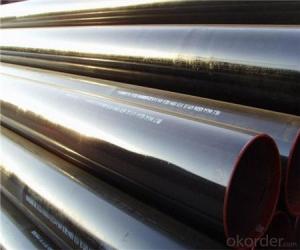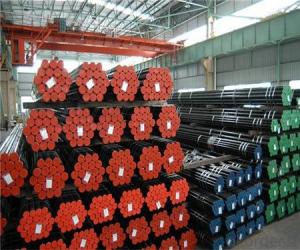Best Selling Seamless Steel pipe Made in China from CNBM
- Loading Port:
- Tianjin
- Payment Terms:
- TT OR LC
- Min Order Qty:
- 25 m.t.
- Supply Capability:
- 2000000 m.t./month
OKorder Service Pledge
OKorder Financial Service
You Might Also Like
1、Structure of Best Selling Seamless Steel pipe Made in China from CNBM:
Seamless pipe is formed by drawing a solid billet over a piercing rod to create the hollow shell. As the manufacturing process does not include any welding, seamless pipes are perceived to be stronger and more reliable. Historically seamless pipe was regarded as withstanding pressure better than other types, and was often more easily available than welded pipe.
2、Main Features of Best Selling Seamless Steel pipe Made in China from CNBM:
• High manufacturing accuracy
• High strength
• Small inertia resistance
• Strong heat dissipation ability
• Good visual effect
• Reasonable price
3、Best Selling Seamless Steel pipe Made in China from CNBM Specification:
Standard | GB, DIN, ASTM ASTM A106-2006, ASTM A53-2007 |
Grade | 10#-45#, 16Mn 10#, 20#, 45#, 16Mn |
Thickness | 8 - 33 mm |
Section Shape | Round |
Outer Diameter | 133 - 219 mm |
Place of Origin | Shandong, China (Mainland) |
Secondary Or Not | Non-secondary |
Application | Hydraulic Pipe |
Technique | Cold Drawn |
Certification | API |
Surface Treatment | factory state or painted black |
Special Pipe | API Pipe |
Alloy Or Not | Non-alloy |
Length | 5-12M |
Outer Diameter | 21.3-610mm |
Grade | 20#, 45#, Q345, API J55, API K55, API L80, API N80, API P110, A53B |
Standard | ASME, ASTM |
1) Material:20#(ASTM A 106/A53 GRB.API5LGRB,GB),45#,16Mn,10#.
2) Specification range:OD:21.3-610mm,WT:6-70mm,length:6-12m or according to the requirement of clients.
3) Excutive standards:GB,ASME API5L.ASTM A 106/A53,Despite of the above standards,we can also supply seamless steel pipe with standard of DIN,JIS,and so on,and also develop new products according to the requirements of our clients!
4) Surface:black lacquered,varnish coating or galvanized.
5) Ends:Beveled or square cut,plastic capped,painted.
6) Packing:bundles wrapped with strong steel strip,seaworthy packing.
4、Packaging & Delivery
Packaging Details: | seaworthy package,bundles wrapped with strong steel strip |
Delivery Detail: | 15-30days after received 30%TT |
5、FAQ of Best Selling Seamless Steel pipe Made in China from CNBM:
①How is the quality of your products?
Our products are manufactured strictly according to national and internaional standard, and we take a test
on every pipe before delivered out. If you want see our quality certifications and all kinds of testing report, please just ask us for it.
Guaranteed: If products’ quality don’t accord to discription as we give or the promise before you place order, we promise 100% refund.
②How about price?
Yes, we are factory and be able to give you lowest price below market one, and we have a policy that “ for saving time and absolutely honest business attitude, we quote as lowest as possible for any customer, and discount can be given according to quantity”,if you like bargain and factory price is not low enough as you think, just don’t waste your time.Please trust the quotation we would give you, it is professional one.
③Why should you chose us?
Chose happens because of quality, then price, We can give you both.Additionally, we can also offer professional products inquiry, products knowledge train(for agents), smooth goods delivery, exellent customer solution proposals.Our service formula: good quality+good price+good service=customer’s trust
SGS test is available, customer inspection before shipping is welcome, third party inspection is no problem.
6、Best Selling Seamless Steel pipe Made in China from CNBM Images:
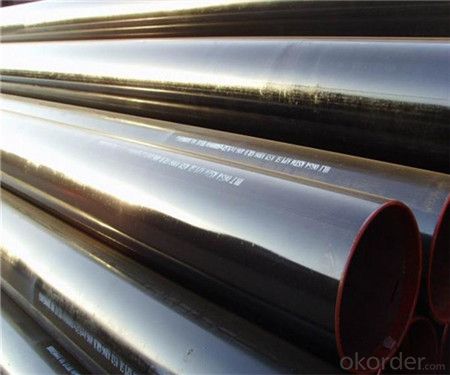
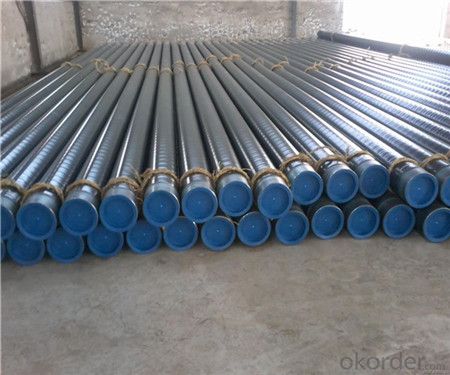
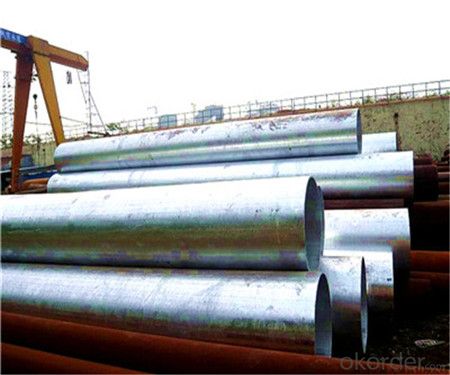
- Q:Are steel pipes suitable for fire protection systems?
- Yes, steel pipes are suitable for fire protection systems. They are widely used due to their durability, strength, and resistance to high temperatures. Steel pipes can efficiently transport water or fire suppressants to extinguish fires effectively, making them a reliable choice for fire protection installations in various buildings and industrial settings.
- Q:How are steel pipes used in automotive manufacturing?
- Steel pipes are widely used in automotive manufacturing for various purposes. One of the primary applications of steel pipes in this industry is for the exhaust system. The exhaust system in vehicles is responsible for the safe removal of harmful gases produced during the combustion process. Steel pipes are used to create the exhaust manifold, which collects the exhaust gases from the engine cylinders and directs them towards the exhaust pipe. Furthermore, steel pipes are also used in the manufacturing of the chassis and frame of vehicles. The chassis provides structural support and helps maintain the overall strength and stability of the vehicle. Steel pipes, due to their high strength and durability, are ideal for creating the chassis and frame. These pipes are often welded together to form a rigid and robust structure that can withstand various forces and impacts. Additionally, steel pipes find applications in the suspension system of automobiles. The suspension system is responsible for providing a comfortable and smooth ride by absorbing shocks and vibrations. Steel pipes are used in the manufacturing of suspension components such as control arms, tie rods, and sway bars. These components help maintain the stability, handling, and overall performance of the vehicle. Moreover, steel pipes are utilized in the fuel system of automobiles. They are used to transport fuel from the fuel tank to the engine. These pipes need to be resistant to corrosion and have high tensile strength to ensure the safe and efficient delivery of fuel. In conclusion, steel pipes play a crucial role in automotive manufacturing. They are used in various applications such as the exhaust system, chassis and frame construction, suspension system, and fuel system. The use of steel pipes in these areas ensures the durability, strength, and performance of vehicles while maintaining safety and efficiency.
- Q:How do you calculate the pipe buoyancy for steel pipes in water?
- The buoyancy of steel pipes in water can be calculated by determining the weight of the water displaced by the submerged portion of the pipe. This can be done by multiplying the volume of the submerged portion of the pipe by the density of water. The buoyant force acting on the pipe can then be calculated by multiplying the weight of the displaced water by the acceleration due to gravity.
- Q:How are steel pipes used in the manufacturing of offshore wind turbines?
- Steel pipes are used in the manufacturing of offshore wind turbines for various purposes such as the foundation, tower, and substructure. These pipes provide structural support and stability to the turbine, ensuring its ability to withstand harsh offshore conditions and strong winds. Additionally, steel pipes are used to transport electrical cables, allowing the turbines to generate and transmit electricity efficiently.
- Q:What are the different types of steel pipe coatings for underground gas pipelines?
- There are several different types of steel pipe coatings used for underground gas pipelines. These include fusion bonded epoxy (FBE) coatings, three-layer polyethylene (3LPE) coatings, polyurethane (PU) coatings, and coal tar enamel (CTE) coatings. Each of these coatings provides different levels of corrosion protection and suitability for specific environmental conditions.
- Q:How can steel pipes be protected from corrosion?
- There are several methods available to protect steel pipes from corrosion. One commonly used method is the application of protective coatings, which create a barrier between the steel and the corrosive elements in the environment. Epoxy is the most widely used coating for steel pipes and offers excellent corrosion resistance. Depending on the specific requirements, polyethylene and polyurethane coatings can also be used. Another effective way to prevent corrosion is through cathodic protection. This technique involves using sacrificial anodes or impressed current systems. Sacrificial anodes, typically made of zinc or aluminum, are attached to the steel pipes and corrode instead of the steel, sacrificing themselves to protect the pipes. Impressed current systems utilize a direct electrical current to counteract the corrosion process. To ensure the longevity of steel pipes, regular maintenance and inspection are crucial. It is important to monitor the condition of the coatings and address any signs of damage or deterioration promptly. Additionally, implementing proper drainage systems to prevent the accumulation of moisture around the pipes is essential for corrosion prevention. Consideration of environmental factors is also necessary when protecting steel pipes from corrosion. This involves mitigating exposure to corrosive substances like acids or chemicals and ensuring adequate ventilation and airflow to prevent moisture and humidity buildup. By implementing a combination of these protective measures, steel pipes can have an extended lifespan and maintain their structural integrity.
- Q:How do steel pipes handle thermal expansion and contraction?
- The unique properties and design of steel pipes enable them to handle thermal expansion and contraction. When exposed to high temperatures, steel pipes expand as the molecules in the material gain energy and become more active. Conversely, when exposed to low temperatures, steel pipes contract as the molecules lose energy and become less active. To accommodate these changes, steel pipes are manufactured with specific features. One such feature is the inclusion of clearance between pipe joints. This clearance allows for expansion and contraction without causing stress or deformation in the pipe. Additionally, expansion joints or flexible connectors are used within the piping system to absorb thermal movements and prevent damage. Moreover, steel pipes are commonly installed with appropriate anchoring and support systems. These systems are designed to allow the pipes to expand and contract within a certain range without exerting excessive stress or strain on the structure or surrounding components. Anchoring and support systems also help maintain the overall stability and integrity of the piping system. In certain cases, thermal insulation materials are applied to steel pipes to minimize temperature changes and mitigate the effects of expansion and contraction. These insulating materials assist in maintaining a consistent temperature within the pipe, thereby reducing the magnitude of thermal movements. Overall, due to their inherent strength and flexibility, steel pipes are well-equipped to handle thermal expansion and contraction. With proper design, installation, and maintenance, steel pipes can effectively accommodate temperature changes without compromising their structural integrity or functionality.
- Q:How do steel pipes withstand high pressure and temperature?
- The inherent properties and construction of steel pipes enable them to endure high pressure and temperature. Steel's strength and durability make it an ideal material for demanding applications. To begin with, steel pipes are crafted from top-notch steel alloys specifically engineered to withstand harsh conditions. These alloys are selected for their high tensile strength, enabling the pipes to withstand the internal pressure exerted by fluids or gases flowing through them. Often, steel used in these pipes is alloyed with elements like chromium, molybdenum, or nickel to enhance its resistance to corrosion and high temperatures. Furthermore, the construction of steel pipes plays a vital role in their ability to withstand high pressure and temperature. Typically, steel pipes are manufactured through seamless or welded processes. Seamless pipes are made by piercing a solid steel billet, resulting in a continuous and uniform pipe without any seams or joints. This seamless construction eradicates weak points and guarantees that the pipe can handle high pressure with no risk of leakage. On the other hand, welded pipes are created by joining two or more pieces of steel together using a welding process. The welds are meticulously inspected and tested to ensure their integrity and strength. Although welded pipes may have seams, they possess equal capability to endure high pressure and temperature when manufactured according to the appropriate standards. Additionally, steel pipes can be further fortified to enhance their resistance to pressure and temperature. For example, pipes used in extremely high-pressure applications may have increased thickness or additional layers of protective coatings. These measures bolster the strength and durability of the pipes, enabling them to withstand even higher pressures and temperatures. In conclusion, steel pipes can endure high pressure and temperature due to the robustness and longevity of the steel alloys used in their construction. The seamless or welded construction of these pipes eliminates weak points and guarantees their ability to handle extreme conditions. Additional reinforcement and protective coatings can be applied to further enhance their resistance to pressure and temperature.
- Q:What are the applications of steel pipes in the automotive industry?
- Steel pipes are commonly used in the automotive industry for various applications such as exhaust systems, fuel lines, and structural components. They offer excellent durability, corrosion resistance, and high tensile strength, making them ideal for carrying fluids and withstanding harsh environments. Additionally, steel pipes can be easily formed and welded, allowing for efficient manufacturing and assembly processes in the automotive sector.
- Q:How are steel pipes used in the manufacturing of oil refineries?
- Steel pipes are essential in the manufacturing of oil refineries as they are used for various purposes such as transporting crude oil, petroleum products, and other fluids throughout the facility. These pipes are used for the construction of pipelines, storage tanks, and various process equipment within the refinery. They provide a reliable and durable means of conveying and distributing fluids necessary for the refining process, ensuring efficient operations and the safe transportation of oil and its byproducts.
1. Manufacturer Overview |
|
|---|---|
| Location | |
| Year Established | |
| Annual Output Value | |
| Main Markets | |
| Company Certifications | |
2. Manufacturer Certificates |
|
|---|---|
| a) Certification Name | |
| Range | |
| Reference | |
| Validity Period | |
3. Manufacturer Capability |
|
|---|---|
| a)Trade Capacity | |
| Nearest Port | |
| Export Percentage | |
| No.of Employees in Trade Department | |
| Language Spoken: | |
| b)Factory Information | |
| Factory Size: | |
| No. of Production Lines | |
| Contract Manufacturing | |
| Product Price Range | |
Send your message to us
Best Selling Seamless Steel pipe Made in China from CNBM
- Loading Port:
- Tianjin
- Payment Terms:
- TT OR LC
- Min Order Qty:
- 25 m.t.
- Supply Capability:
- 2000000 m.t./month
OKorder Service Pledge
OKorder Financial Service
Similar products
New products
Hot products
Related keywords

